|
|
|
Sort Order |
|
|
|
Items / Page
|
|
|
|
|
|
|
| Srl | Item |
| 1 |
ID:
145124
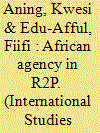

|
|
|
|
|
| Summary/Abstract |
Both the African Union (AU) and the Economic Community of West African States (ECOWAS) have been global leaders in embracing and operationalizing responsibility to protect (R2P). The adoption of the AU’s Constitutive Act, Article 4 (h) in 2000, has transformed its old-fashioned principle of noninterference to one of nonindifference. This authorizes the AU to intervene in Member States with respect to war crimes, genocide, ethnic cleansing, and crimes against humanity. ECOWAS has through its conflict prevention, management, and resolution protocol and its conflict prevention framework deepened and practicalized the notion of sovereignty as responsibility. These frameworks from both the AU and the ECOWAS have close similarities to the R2P norms. However, although these notions are captured in official documents, their actual operationalization faces challenges relating to sovereignty, limited institutional capacity, a restricted appetite for enforcement action, and a lack of explicit instruments to activate their intervention clauses in R2P-like situations. In spite of these challenges, the article argues that the initiatives of both the AU and the ECOWAS in Mali, Cote d’Ivoire, and Libya demonstrated a positively active African agency in contributing to global peace processes. This article, therefore, assesses the successes and limitations of African regional agency in enforcing R2P-like norms among its member states and its implications for and contributions to global international relations discourses.
|
|
|
|
|
|
|
|
|
|
|
|
|
|
|
|
| 2 |
ID:
097677
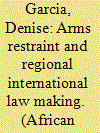

|
|
|
|
|
| Publication |
2009.
|
| Summary/Abstract |
This article analyses the political evolution and legal structure of the Economic
Community of Western African States (ECOWAS) Convention on Small Arms and
Light Weapons, Their Ammunition and Other Related Material, adopted in 2006,
within the broader context of the small arms debate at the regional (initiatives by Mali)
and international levels, principally at the United Nations. The ECOWAS Convention
breaks new ground as it is based on human security, international humanitarian law,
sustainable development and human rights principles. The ECOWAS Convention is
groundbreaking in many respects. It is innovative especially vis-à-vis basing its text on
international humanitarian law, international human rights law and development needs.
In comparison with all other instruments of law on small arms, it is one of the most
evolved.
|
|
|
|
|
|
|
|
|
|
|
|
|
|
|
|
| 3 |
ID:
087415
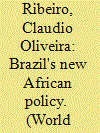

|
|
|
|
|
| Publication |
2009.
|
| Summary/Abstract |
Mindful of a shared colonial heritage, the left wing administration of president Lula de Silva has paid great attention to Brazil's diplomatic, political, economic and cultural relations with Africa
|
|
|
|
|
|
|
|
|
|
|
|
|
|
|
|
| 4 |
ID:
046518
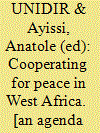

|
|
|
|
|
| Publication |
Geneva, United Nations Institute for Disarmament Research, 2001.
|
| Description |
xiv, 154p.
|
| Standard Number |
9290451048
|
|
|
|
|
|
|
|
|
|
|
|
Copies: C:1/I:0,R:0,Q:0
Circulation
| Accession# | Call# | Current Location | Status | Policy | Location |
| 045169 | 327.1720966/UNI 045169 | Main | On Shelf | General | |
|
|
|
|
| 5 |
ID:
175523
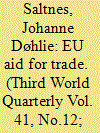

|
|
|
|
|
| Summary/Abstract |
Does the EU’s Aid for Trade (AfT) initiative contribute to global justice? Complementing work that considers distributive justice, in this paper we adopt the central tenets of the republican theory of non-domination as a regulative ideal for justice in international relations. We evaluate the extent to which the EU’s AfT initiative results from reduced political domination in international trade negotiations, and if that then mitigates economic dependency between European and African states. We first provide a qualitative account of the processes that led to the establishment and subsequent development of AfT. We then consider the extent to which the AfT has promoted the reliance of African states on European foreign direct investment (FDI) relative to FDI from other regions (including and especially from within Africa itself) using subnational, project-level, data. Our findings suggest that EU AfT does not reinforce dominating forms of dependency in the international arena, at least when measured by the source of the FDI that it attracts, while AfT is itself an outcome of somewhat less dominating power relations in trade negotiations between wealthier and poorer states.
|
|
|
|
|
|
|
|
|
|
|
|
|
|
|
|
| 6 |
ID:
156544
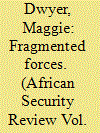

|
|
|
|
|
| Summary/Abstract |
This article provides a detailed look at the history of the Gambia Armed Forces (GAF), a military that has received very little academic attention within the study of African state security forces. It identifies key turning points in the GAF’s history, and highlights the vastly different roles the military played in the state under President Jawara (1965–94) and President Jammeh (1994–2017). Yet, it also highlights important similarities regarding internal patterns within the armed forces and shows the ways in which these continuities may challenge attempts to restructure the security sector. The article draws on archival research and interviews conducted with retired and active duty Gambian military personnel, government officials, and Gambian scholars.
|
|
|
|
|
|
|
|
|
|
|
|
|
|
|
|
| 7 |
ID:
151710
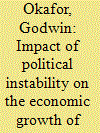

|
|
|
|
|
| Summary/Abstract |
This study contributes to the literature on political instability and economic growth by specifically investigating the impact of political instability on the economic growth of member countries of the Economic Community of West African States (ECOWAS). West Africa is regarded as the riskiest sub-region within the African continent. To achieve this objective, this study employed panel data techniques (fixed effects and generalised method of moments) on a sample of 15 ECOWAS member countries for the period 2005–2012. The findings from the analyses showed that terrorism, poor governance, social unrest, youth unemployment, death rate and natural resource rent have negative relationships with economic growth. The findings and policy implications deduced from this study could not have been any timelier considering the recent escalation of instability in West African countries and their fragile growth prospects.
|
|
|
|
|
|
|
|
|
|
|
|
|
|
|
|
| 8 |
ID:
182433
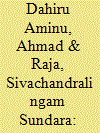

|
|
|
|
|
| Summary/Abstract |
The Economic Community of West African States (ECOWAS) was founded exclusively to focus on economic integration. However, in 1976, the Nigerian government proposed the adoption of a non-aggression protocol to regulate issues of regional collective security. The proposal was accepted in principle and the secretariat was tasked to formulate policy prescriptions for adoption of the decision organs. Using historical techniques, this article peruses existing literature, official reports and minutes of meetings of the ECOWAS authority and Council of Ministers to highlight the successes of the executive secretariat and reflect on the political, structural and security challenges that it encountered in facilitating the implementation of inter-organisational cooperation in the Liberian crisis.
|
|
|
|
|
|
|
|
|
|
|
|
|
|
|
|
| 9 |
ID:
177037
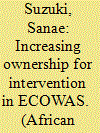

|
|
|
|
|
| Summary/Abstract |
After the Cold War, not only the United Nations (UN) but also regional organisations began to engage in the internal conflicts of their member states. The Economic Community of West African States (ECOWAS) has long intervened in West African conflicts, and institutionalised its approach to interventions in 1999. Since then, member states have maintained and even increased their commitment to managing conflicts in West Africa regionally – a willingness that implies their ownership of interventions. This article argues that ECOWAS member states share ownership because they have developed a common understanding about intervention. The development of this common understanding is analysed with a focus on the origin and evolution of ECOWAS, that is, on the multi-level process of generating consensus and on the principle and practice of sharing the costs of resource mobilisation. I will show that, in practice, these processes led each state to perceive an enhanced sense of ownership in ECOWAS interventions. Case studies of ECOWAS interventions in Liberia, Sierra Leone, Guinea-Bissau and Cote d’Ivoire in the 1990s and the 2000s, the period when the organisation’s interventions became institutionalised, support the argument.
|
|
|
|
|
|
|
|
|
|
|
|
|
|
|
|
| 10 |
ID:
103972
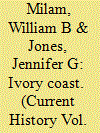

|
|
|
| 11 |
ID:
167098
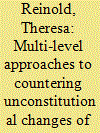

|
|
|
|
|
| Summary/Abstract |
This article assesses the impact of multi-level approaches to the problem of unconstitutional changes of government (UCGs) on the rule of law at the national and global level. Based on a single-case study of the 2016 Gambian UCG, this article concludes that multi-level governance tends to strengthen the rule of law at the national level, but only if certain conditions are met. These include an agreement about the rules of the road regulating how the different layers of governance interact – subsidiarity v. precedence for organizations from higher levels of governance – and the definition of a common purpose. Such unity of purpose is easier to attain if the (geo)political stakes of a crisis are relatively low, the prospects of success of a military intervention high, and if the perpetrators of the UCG have forfeited their legitimacy both locally and globally. This prevents them from exploiting institutional rivalries and shrinks their space for diplomatic manoeuvre and thus their ability to use forum shopping for their benefit. If these conditions are met, then multi-level responses to UCG will strengthen the rule of law at the domestic level, while at the same time potentially undermining the rule of law at the global level.
|
|
|
|
|
|
|
|
|
|
|
|
|
|
|
|
| 12 |
ID:
079678
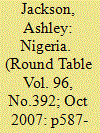

|
|
|
|
|
| Publication |
2007.
|
| Summary/Abstract |
This article surveys the security challenges faced by Nigeria: political instability, tensions between the federal government and the regions, instability in the Delta Region, environmental degradation, religious rivalry and violence. It examines Nigeria's role in regional peacekeeping and in ECOWAS and the interests of the USA, UK, China, the UN and the EU.
|
|
|
|
|
|
|
|
|
|
|
|
|
|
|
|
| 13 |
ID:
172877
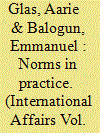

|
|
|
|
|
| Summary/Abstract |
The Association of Southeast Asian Nations (ASEAN) and the Economic Community of West African States (ECOWAS) both recently adopted and institutionalized the norm of people-centric governance. This is potentially transformative for both, signalling a reorientation away from their private and elite-led normative foundations. In practice, however, the norm is understood and enacted in different ways by officials at each organization and with radically different effects. In ASEAN, the norm is understood and enacted in a limited and defensive way. Its institutionalization has led only to selective engagement with civil society and has not altered established modes of regional governance. In ECOWAS, however, the norm is understood as a means to render the organization more inclusive of civil society groups and has transformed the regional project in important ways, shaping the logic and form of regional intervention and conflict prevention. To explore these experiences—convergence in adoption and institutionalization of a norm and variation in its practice and effect—we develop a practice theoretic framework and rely on 76 interviews with regional and state officials. We show that each organizational case is usefully conceptualized as a community of practice wherein external norms are understood and practiced in particular ways and with particular effect.
|
|
|
|
|
|
|
|
|
|
|
|
|
|
|
|
| 14 |
ID:
150789
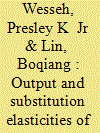

|
|
|
|
|
| Summary/Abstract |
This study estimates output and substitution elasticities of renewable energy and nonrenewable energy for the Economic Community of West African States (ECOWAS) and discusses implications for expanding the former. The results show that nonrenewable energy promises greater benefits for ECOWAS economic transition, with output elasticities averaging between 0.052–0.579 and −0.055 to 0.223 for nonrenewable energy and renewable energy respectively. Overall estimated technological progress is low (−0.5% to 2.6%); the bulk coming from input efficiency. Substitution elasticities (0.02–0.94) suggest potential for switching towards renewable energy. Notwithstanding, scale, economics and sitting problems inherent in renewable power generation challenge the opportunities for energy substitution. A sustainable policy solution, therefore, appears to be one favoring scaled and efficient electricity generation from fossil energy in the short-run with a gradual switch towards renewable power in the long-run. In general, the applied model provides insights that energy efficiency enhances sustainable growth by propelling technological advancement especially when technical change is scale-biased and factor-augmenting. The study also provides insights that impacts of exogenous shocks to inputs are temporary, and hence, do not jeopardize efforts aimed at scaling output through increased and efficient use of labor, capital and energy; especially nonrenewable energy.
|
|
|
|
|
|
|
|
|
|
|
|
|
|
|
|
| 15 |
ID:
138987
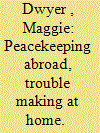

|
|
|
|
|
| Summary/Abstract |
This article draws attention to a trend in which military deployments as part of peacekeeping missions have triggered army mutinies in some West African countries. It explains how participation in peacekeeping missions created new material grievances and a sense of injustice amongst the peacekeepers, which under certain conditions sparked domestic mutinies. These uprisings in West Africa follow a history of military disobedience in the region, and the article places them in the context of long-standing tensions within military organizations. Mutinies often symbolize and intensify divisions within armed forces, which can lead to further instability even after the mutiny is resolved. Therefore, it is important for those interested in building and maintaining effective militaries to understand the ways in which deployments and peacekeeping participation can contribute to unrest within the armed forces. The article draws on interviews with former mutineers, including peacekeepers, and others military personnel in West Africa, as well as media reporting, including public statements made by mutineers, academic writing, and archival research.
|
|
|
|
|
|
|
|
|
|
|
|
|
|
|
|
| 16 |
ID:
124450
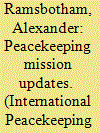

|
|
|
|
|
| Publication |
2013.
|
| Summary/Abstract |
All members of the National Commission for Dialogue and Reconciliation, including its President and Vice-Presidents, officially took office in March and April. There was criticism in some quarters that the selection process for membership had not been transparent and that there had been inadequate inclusion of religious, community and traditional leaders.
|
|
|
|
|
|
|
|
|
|
|
|
|
|
|
|
| 17 |
ID:
168490
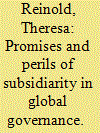

|
|
|
|
|
| Summary/Abstract |
In the messy world of global governance, the principle of subsidiarity has the potential to order relations between different layers of governance as well as compensate for the legitimacy deficit of global governance institutions. However, subsidiarity has received surprisingly little scholarly attention in the discipline of International Relations. This article therefore seeks to examine the promises and perils of subsidiarity in global governance by adducing empirical evidence from Africa, a region which has authored norms and policies that often contest global norms and institutions. Based on two case studies of pro-democratic intervention in The Gambia and court proliferation at the (sub-)regional levels, the article concludes that while subsidiarity may strengthen democracy and the rule of law at the national level, it may also undermine the rule of law at the global level, as well as dilute fundamental global norms that serve to protect basic human rights. At the same time, subsidiarity provides opportunities for normative innovation, which suggests that more attention needs to be paid to the law-generating effects of subsidiarity and to the Global South as an agent of change in international law and global governance.
|
|
|
|
|
|
|
|
|
|
|
|
|
|
|
|
| 18 |
ID:
174550
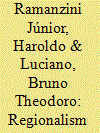

|
|
|
|
|
| Summary/Abstract |
The aim of this article is to analyse the performance of regionalism in the Global South through a comparative analysis of Mercosur and Ecowas with regard to the trade and democracy protection agendas, by contrasting their institutional design and regional leadership concerning the two issues. Firstly, it analyses the evolution of intra-regional trade as well as the trade agenda of each bloc concerning international negotiations with other states or economic blocs. Secondly, it discusses the relevance of democratic stability in the two regional organisations and how each organisation has performed in cases of democratic rupture in member states. When comparing the dynamics of the two organisations, we argue that differences in terms of institutional design and regional leadership have meant that Ecowas has been less ambitious than Mercosur in its trade agenda, but more decisive vis-à-vis the region’s democratic stability. Thus, this article aims to contribute to the comparative regionalism literature, setting out an analytical comparative framework for assessing the performance of regional organisations, which remains a difficult task for this particular research agenda.
|
|
|
|
|
|
|
|
|
|
|
|
|
|
|
|
| 19 |
ID:
173193
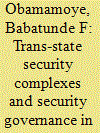

|
|
|
|
|
| Summary/Abstract |
Security discourse in contemporary times has brought to the fore the relevance of regions as indispensable loci for analysing, understanding and managing security challenges across many spaces of the globe. In the process of deepening this discursive analysis of regional security, scholars have developed a few concepts. Two of these analytical concepts are ‘security complexes’ and ‘regional security governance’. However, extant literature rarely examines the conceptual and empirical interplay between these two constructs. It is on this note that this article asks: how are security complexes and security governance impacting one another? To what extent could their pragmatic interactions shape the choice of regional organisations that will coordinate joint security undertakings? It argues that while it is the formation of security complexes from a trans-state perspective that will generate the necessity for regional security governance, the dissolution of such a complex equally demands an effective orchestration of regional security governance. The article also contends that the spatial scope of a trans-state security complex is a central factor for determining the appropriateness of the regional organisation that will coordinate its security governance project. It specifically draws on empirical evidence from West Africa to bolster these arguments.
|
|
|
|
|
|
|
|
|
|
|
|
|
|
|
|
| 20 |
ID:
152745
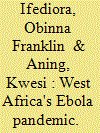

|
|
|
|
|
| Summary/Abstract |
The Ebola virus disease (EVD) outbreak in West Africa in 2014 became the region's most dangerous pandemic in history. Initially misdiagnosed by health authorities in Liberia, Guinea, and Sierra Leone, the epicenters of the crises, the wider health infrastructure of the international community similarly failed to grasp the enormity of the challenge posed by this pandemic to West Africa and its potential global ramifications. By the time recognition dawned about the immensity of the challenges that were posed by this pandemic, it took the introduction of extraordinary measures through the characterization of the disease as a threat to international peace and security pursuant to Chapter VII of the UN Charter to get the necessary institutional and bureaucratic machineries to intervene. This article argues that EVD, disastrous in its outcome, exposed the weaknesses and failures of existing institutional frameworks at national, regional, and continental to global levels. Focusing primarily on multilateral responses (the UN, the African Union [AU], and the Economic Community of West African States [ECOWAS]) to the epidemic, this article argues for enhanced global-regional collaboration in the context of the UN Charter's Chapter VIII for more effective future responses to health crises in West Africa. This article contributes to the ongoing debate on the reform of global health governance by analyzing the existing health governance strategies established by ECOWAS and implemented through the West African Health Organization.
|
|
|
|
|
|
|
|
|
|
|
|
|
|
|
|
|
|
|
|
|